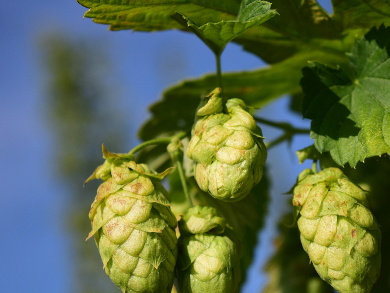Usually, hops are added during the wort boiling process in a brewery. Some of the essential oils responsible for the hoppy beer aroma are very volatile. Boiling has a negative influence on their concentrations. To achieve a strong hop aroma, hops can be added in the cold-process area of a brewery. This procedure is called dry hopping.
Martina Gastl, Technical University Munich, Germany, and her colleagues examined the concentrations of aromatic hop compounds in beers that were dry hopped in laboratory-scale trials (17 L of beer), semi-industrial scale trials (800 L), and industrial-scale trials (14,100 L). The team used gas chromatography-mass spectrometry (GC-MS) as well as a trained tasting panel to analyze the beer. The team found that the concentrations of the main aroma compounds of dry hopped beers (myrcene and linalool) depend on the scale of the trial. The tasters were also able to detect the differences.
The influencing parameters still need to be identified. Possible influences could be the varying headspace volume of the tanks, the energy input, or the mixing movement during the extraction. Therefore, brewers need to adjust the recipe while scaling up laboratory-scale trials to industrial-scale trials.
- Scale-up of Dry Hopping Trials: Importance of Scale for Aroma and Taste Perceptions,
Martin Schnaitter, Adrian Kell, Hubert Kollmannsberger, Florian Schüll, Martina Gastl, Thomas Becker,
Chem. Ing. Tech. 2016, 88, 1955–1965.
DOI: 10.1002/cite.201600040This article is part of a Special Issue on “500 Jahre Deutsches Reinheitsgebot – Verfahrenstechnik rund ums Bier” (500 Years of the German Beer Purity Law)
Also of Interest
- 500 Years of Reinheitsgebot,
ChemistryViews.org 2016.
German beer purity law was adopted in 1516 and limited ingredients to barley, hops, and water




